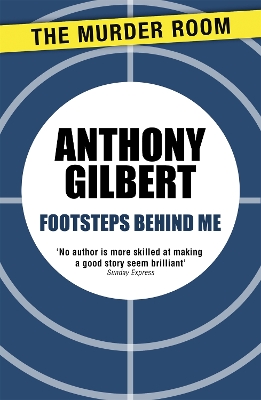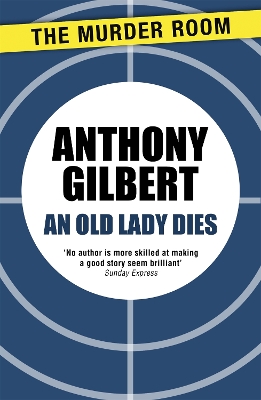Murder Room
51 total works
When an accident begins to look like murder...
Classic crime from one of the greats of the Detection Club
On a quiet country station, Detective Arthur Crook, waiting for the train to London, witnessed a near-fatal accident. Despite the arm of her companion, Miss Imogen Garland slipped and almost fell under the train. No harm was done, and Arthur Crook might not have thought anything more about it had not a newspaper item a few weeks later caught his eye. Miss Garland had once again been involved in an accident, this time fatal. Only it was not Miss Garland who had died . . .
Suicide - or murder? The tiniest clue holds the answer.
Classic crime from one of the greats of the Detection Club
When Florence Penny's body is found hanging from a beam in the bedsit she has been renting, it looks to Inspector Field like a case of suicide. Soon, though, he realises murder is the motive, and the discovery of a single pink bead among the disordered bedclothes leads him to prime suspect Charles Hobart.
It's now up to Scott Egerton, Hobart's prospective brother-in-law, and an astute private inquiry agent named Gordon to establish Hobart's innocence . . .
He knows their darkest secrets - but they are even more ruthless than him, with murder in mind...
Classic crime from one of the greats of the Detection Club
Teddy Lane has sunk into the sordid depths of blackmail and thinks he is on to a good thing. He knows the dark secrets of four people who have everything to lose if they are exposed - a young actress, a criminal lawyer, a scientist, and an elderly woman with a doctor son.
What he hasn't bargained for is that two people are more ruthless than him. And they will not let him get away with it, even if it means murder - his murder.
Did the twelfth member of the jury know something the rest did not...?
Classic crime from one of the greats of the Detection Club
Circumstantial evidence was as good as proof in the trial of Viola Ross. Everything pointed to the conclusion that this beautiful woman had smothered her wisp of a husband. But the twelfth juror, Richard Arnold, would not agree. Perhaps he knew something which the others didn't - perhaps he only guessed.
When a retrial is ordered, Arnold sets out to conduct his own investigation. But soon he is faced with three attempts on his life.
A cliff-top house, a body on the beach, a man who suspects his best friend...
Classic crime from one of the greats of the Detection Club
When Doctor Terence Ambrose visits Gervase Blount at Four Corners he notices the body of a man low down on a cliff near the house. His enquiries into the man's death point suspicion at several people, particularly his old friend from Balliol Gervase Blount himself.
As he delves into the past a complicated web of intrigue is slowly exposed...
After years of caring for her often impossible mother, Alice is finally free. But an unexpected legacy gives her more than she bargained for...
Classic crime from one of the greats of the Detection Club
When Alice Hunter's mother dies, after grimly clinging on for eighty-odd years, it is enough for genteel Alice just to be free. But she soon becomes lonely, having few points of contact with the people in the cheap boarding houses which are all she can afford. Then comes news of a legacy, and Alice's soul rises as she travels to the family's lawyers in Bath.
Her new life is not what she expects, however, and she is lost in a fog of human misunderstanding, hatred and deceit. A nice cup of tea, stirred by detective Arthur Crook, is what she will need to put things right . . .
In a small English town, family conflict can be murder...
Classic crime from one of the greats of the Detection Club
When spinster Emily Foss, who ran the haberdashery, is found bludgeoned to death, the silver pencil that had surely been in her purse that night is found in brash young Lennie Hunter's possession, and it is he who is to be hanged for the crime.
To clear his name, Hunter's fiancée brings in Detective Arthur Crook. Soon Crook discovers Emily was not on good terms with her nephew, his wife, or many others in the small English town where she lived. Faced with a maze of hidden motives, Crook must contrive against the clock to trap the real murderer.
'No author is more skilled at making a good story seem brilliant' Sunday Express
'No author is more skilled at making a good story seem brilliant' Sunday Express
When Julia Ross, a jobless and penniless girl, is sent to meet a prospective employer, she is oblivious to the trap that awaits her. As she rings the bell to 30 Henriques Square, the door opens on a London household ruled by a red-wigged old lady with murderous intentions.
Two days later, Julia awakes in a different house in different clothes and with a new identity. And it's down to lawyer-sleuth Arthur Crook to rescue the missing heroine and clear out the villainous nest.
'An excellent thriller' Time Magazine
The first time he saw her she stole his heart. The second time she was dead.
Classic crime from one of the greats of the Detection Club
When Detective Arthur Crook first saw Stella Foster he knew she was marked for trouble. Stella was irresistible to men, a woman who loved laughter and pleasure - a woman, in fact, after Mr Crook's heart. The next time he saw her, Stella was dead.
To find her killer, London's genial detective pursues his unorthodox way through a maze of tangled and conflicting clues to solve a clever and brutal crime of passion.
'Unquestionably a most intelligent author. Gifts of ingenuity style and character drawing' Sunday Times
Margaret Fielding was tried for the murder of her first husband ten years ago and, innocent, was acquitted for lack of evidence. Now someone is threatening to produce evidence that could convict her.
Classic crime from one of the greats of the Detection Club
Fortunately, Margaret meets Arthur Crook, the detective lawyer to whom the innocent turn, never in vain. When her blackmailer is found murdered, just after she is seen, distraught, leaving the premises, it is to Crook that she tells her tale. But someone knows Crook by reputation, and is anxious that he does not take on Margaret's case.
Mrs Wolfe was dying - at last. Nobody seemed very sorry about it. Certainly not her relatives or legatees. Mrs Wolfe was wealthy and domineering and her periodical relapses regularly brought her heirs rushing to her bedside.
The old lady derived a grim satisfaction from controlling people, but there's one last thing she is unable to control. For when Mrs Wolfe does die it is not by natural causes, but by treachery . . .









